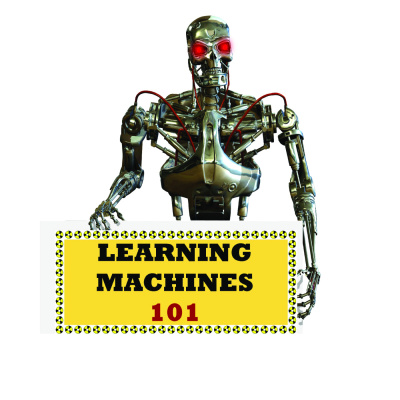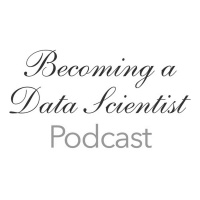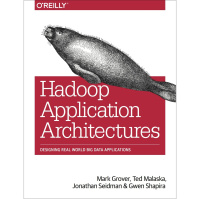Sinopsis
Smart machines based upon the principles of artificial intelligence and machine learning are now prevalent in our everyday life. For example, artificially intelligent systems recognize our voices, sort our pictures, make purchasing suggestions, and can automatically fly planes and drive cars. In this podcast series, we examine such questions such as: How do these devices work? Where do they come from? And how can we make them even smarter and more human-like? These are the questions which will be addressed in the podcast series Learning Machines 101.
Episodios
-
LM101-046: How to Optimize Student Learning using Recurrent Neural Networks (Educational Technology)
23/02/2016 Duración: 23minIn this episode, we briefly review Item Response Theory and Bayesian Network Theory methods for the assessment and optimization of student learning and then describe a poster presented on the first day of the Neural Information Processing Systems conference in December 2015 in Montreal which describes a Recurrent Neural Network approach for the assessment and optimization of student learning called “Deep Knowledge Tracing”. For more details check out: www.learningmachines101.com and follow us on Twitter at: @lm101talk
-
LM101-045: How to Build a Deep Learning Machine for Answering Questions about Images
08/02/2016 Duración: 21minIn this episode we discuss just one out of the 102 different posters which was presented on the first night of the 2015 Neural Information Processing Systems Conference. This presentation describes a system which can answer simple questions about images. Check out: www.learningmachines101.com for additional details!!
-
LM101-044: What happened at the Deep Reinforcement Learning Tutorial at the 2015 Neural Information Processing Systems Conference?
26/01/2016 Duración: 31minThis is the third of a short subsequence of podcasts providing a summary of events associated with Dr. Golden’s recent visit to the 2015 Neural Information Processing Systems Conference. This is one of the top conferences in the field of Machine Learning. This episode reviews and discusses topics associated with the Introduction to Reinforcement Learning with Function Approximation Tutorial presented by Professor Richard Sutton on the first day of the conference. Check out: www.learningmachines101.com to learn more!! Also follow us at: "lm101talk" on twitter!
-
LM101-043: How to Learn a Monte Carlo Markov Chain to Solve Constraint Satisfaction Problems (Rerun of Episode 22)
12/01/2016 Duración: 27minWelcome to the 43rd Episode of Learning Machines 101!We are currently presenting a subsequence of episodes covering the events of the recent Neural Information Processing Systems Conference. However, this weekwill digress with a rerun of Episode 22 which nicely complements our previous discussion of the Monte Carlo Markov Chain Algorithm Tutorial. Specifically, today wediscuss the problem of approaches for learning or equivalently parameter estimation in Monte Carlo Markov Chain algorithms. The topics covered in this episode include: What is the pseudolikelihood method and what are its advantages and disadvantages?What is Monte Carlo Expectation Maximization? And...as a bonus prize...a mathematical theory of "dreaming"!!! The current plan is to returnto coverage of the Neural Information Processing Systems Conference in 2 weeks on January 25!! Check out: www.learningmachines101.com for more details!
-
LM101-042: What happened at the Monte Carlo Markov Chain (MCMC) Inference Methods Tutorial at the 2015 Neural Information Processing Systems Conference?
29/12/2015 Duración: 25minThis is the second of a short subsequence of podcasts providing a summary of events associated with Dr. Golden’s recent visit to the 2015 Neural Information Processing Systems Conference. This is one of the top conferences in the field of Machine Learning. This episode reviews and discusses topics associated with the Monte Carlo Markov Chain (MCMC) Inference Methods Tutorial held on the first day of the conference. Check out: www.learningmachines101.com to listen or download this podcast episode or download the transcripts! Also visit us at LINKEDIN or TWITTER. The twitter handle is: LM101TALK
-
LM101-041: What happened at the 2015 Neural Information Processing Systems Deep Learning Tutorial?
16/12/2015 Duración: 29minThis is the first of a short subsequence of podcasts which provides a summary of events associated with Dr. Golden’s recent visit to the 2015 Neural Information Processing Systems Conference. This is one of the top conferences in the field of Machine Learning. This episode introduces the Neural Information Processing Systems Conference and reviews the content of the Morning Deep Learning Tutorial which took place on the first day of the conference. Check out: www.learningmachines101.comfor additional supplementary hyperlinks to the conference and conference papers!!
-
LM101-040: How to Build a Search Engine, Automatically Grade Essays, and Identify Synonyms using Latent Semantic Analysis
24/11/2015 Duración: 28minIn this episode we introduce a very powerful approach for computing semantic similarity between documents. Here, the terminology “document” could refer to a web-page, a word document, a paragraph of text, an essay, a sentence, or even just a single word. Two semantically similar documents, therefore, will discuss many of the same topics while two semantically different documents will not have many topics in common. Machine learning methods are described which can take as input large collections of documents and use those documents to automatically learn semantic similarity relations. This approach is called Latent Semantic Indexing (LSI) or Latent Semantic Analysis (LSA). Visit us at: www.learningmachines101.com to learn more!
-
LM101-039: How to Solve Large Complex Constraint Satisfaction Problems (Monte Carlo Markov Chain and Markov Fields)[Rerun]
09/11/2015 Duración: 35minIn this episode we discuss how to solve constraint satisfaction inference problems where knowledge is represented as a large unordered collection of complicated probabilistic constraints among a collection of variables. The goal of the inference process is to infer the most probable values of the unobservable variables given the observable variables. Concepts of Markov Random Fields and Monte Carlo Markov Chain methods are discussed. For additional details and technical notes, please visit the website: www.learningmachines101.com Also feel free to visit us at twitter: @lm101talk
-
LM101-038: How to Model Knowledge Skill Growth Over Time using Bayesian Nets
27/10/2015 Duración: 23minIn this episode, we examine the problem of developing an advanced artificially intelligent technology which is capable of tracking knowledge growth in students in real-time, representing the knowledge state of a student a skill profile, and automatically defining the concept of a skill without human intervention! The approach can be viewed as a sophisticated state-of-the-art extension of the Item Response Theory approach to Computerized Adaptive Testing Educational Technology described in Episode 37. Both tutorial notes and advanced implementational notes can be found in the show notes at: www.learningmachines101.com.
-
LM101-037: How to Build a Smart Computerized Adaptive Testing Machine using Item Response Theory
12/10/2015 Duración: 34minIn this episode, we discuss the problem of how to build a smart computerized adaptive testing machine using Item Response Theory (IRT). Suppose that you are teaching a student a particular target set of knowledge. Examples of such situations obviously occur in nursery school, elementary school, junior high school, high school, and college. However, such situations also occur in industry when top professionals in a particular field attend an advanced training seminar. All of these situations would benefit from a smart adaptive assessment machine which attempts to estimate a student’s knowledge in real-time. Such a machine could then use that information to optimize the choice and order of questions to be presented to the student in order to develop a customized exam for efficiently assessing the student’s knowledge level and possibly guiding instructional strategies. Both tutorial notes and advanced implementational notes can be found in the show notes at: www.learningmachines101.com .
-
LM101-036: How to Predict the Future from the Distant Past using Recurrent Neural Networks
28/09/2015 Duración: 25minIn this episode, we discuss the problem of predicting the future from not only recent events but also from the distant past using Recurrent Neural Networks (RNNs). A example RNN is described which learns to label images with simple sentences. A learning machine capable of generating even simple descriptions of images such as these could be used to help the blind interpret images, provide assistance to children and adults in language acquisition, support internet search of content in images, and enhance search engine optimization websites containing unlabeled images. Both tutorial notes and advanced implementational notes for RNNs can be found in the show notes at: www.learningmachines101.com .
-
LM101-035: What is a Neural Network and What is a Hot Dog?
15/09/2015 Duración: 28minIn this episode, we address the important questions of “What is a neural network?” and “What is a hot dog?” by discussing human brains, neural networks that learn to play Atari video games, and rat brain neural networks. Check out: www.learningmachines101.com for videos of a neural network that learns to play ATARI video games and transcripts of this podcast!!! Also follow us on twitter at: @lm101talk See you soon!!
-
LM101-034: How to Use Nonlinear Machine Learning Software to Make Predictions (Feedforward Perceptrons with Radial Basis Functions)[Rerun]
25/08/2015 Duración: 29minWelcome to the 34th podcast in the podcast series Learning Machines 101 titled "How to Use Nonlinear Machine Learning Software to Make Predictions". This particular podcast is a RERUN of Episode 20 and describes step by step how to download free software which can be used to make predictions using a feedforward artificial neural network whose hidden units are radial basis functions. This is essentially a nonlinear regression modeling problem. Check out: www.learningmachines101.comand follow us on twitter: @lm101talk
-
LM101-033: How to Use Linear Machine Learning Software to Make Predictions (Linear Regression Software)[RERUN]
10/08/2015 Duración: 31minIn this episode will explain how to download and use free machine learning software which can be downloaded from the website: www.learningmachines101.com. The software can be used to make predictions using your own data sets. Although we will continue to focus on critical theoretical concepts in machine learning in future episodes, it is always useful to actually experience how these concepts work in practice.This is a rerun of Episode 13.
-
LM101-032: How To Build a Support Vector Machine to Classify Patterns
13/07/2015 Duración: 35minIn this 32nd episode of Learning Machines 101, we introduce the concept of a Support Vector Machine. We explain how to estimate the parameters of such machines to classify a pattern vector as a member of one of two categories as well as identify special pattern vectors called “support vectors” which are important for characterizing the Support Vector Machine decision boundary. The relationship of Support Vector Machine parameter estimation and logistic regression parameter estimation is also discussed. Check out this and other episodes as well as supplemental references to these episodes at the website: www.learningmachines101.com. Also follow us at twitter using the twitter handle: lm101talk.
-
LM101-031: How to Analyze and Design Learning Rules using Gradient Descent Methods (RERUN)
21/06/2015 Duración: 32minIn this rerun of Episode 16, we introduce the important concept of gradient descent which is the fundamental principle underlying learning mechanisms in a wide range of machine learning algorithms. Check out the transcripts of this episode and related references and software at: www.learningmachines101.com !!!
-
LM101-030: How to Improve Deep Learning Performance with Artificial Brain Damage (Dropout and Model Averaging)
08/06/2015 Duración: 32minDeep learning machine technology has rapidly developed over the past five years due in part to a variety of actors such as: better technology, convolutional net algorithms, rectified linear units, and a relatively new learning strategy called "dropout" in which hidden unit feature detectors are temporarily deleted during the learning process. This article introduces and discusses the concept of "dropout" to support deep learning performance and makes connections of the "dropout" concept to concepts of regularization and model averaging. For more details and background references, check out: www.learningmachines101.com !
-
LM101-029: How to Modernize Deep Learning with Rectilinear units, Convolutional Nets, and Max-Pooling
25/05/2015 Duración: 35minThis podcast discusses talks, papers, and ideas presented at the recent International Conference on Learning Representations 2015 which was followed by the Artificial Intelligence in Statistics 2015 Conference in San Diego. Specifically, commonly used techniques shared by many successful deep learning algorithms such as: rectilinear units, convolutional filters, and max-pooling are discussed. For more details please visit our website at: www.learningmachines101.com!
-
LM101-028: How to Evaluate the Ability to Generalize from Experience (Cross-Validation Methods)[RERUN]
11/05/2015 Duración: 35minThis rerun of an earlier episode of Learning Machines 101 discusses the problem of how to evaluate the ability of a learning machine to make generalizations and construct abstractions given the learning machine is provided a finite limited collection of experiences. Check out: www.learningmachines101.com to obtain transcripts of this podcast and download free machine learning software!
-
LM101-027: How to Learn About Rare and Unseen Events (Smoothing Probabilistic Laws)[RERUN]
28/04/2015 Duración: 39minIn this episode of Learning Machines 101 we discuss the design of statistical learning machines which can make inferences about rare and unseen events using prior knowledge. Check out: www.learningmachines101.com to obtain transcripts of this podcast and download free machine learning software!












